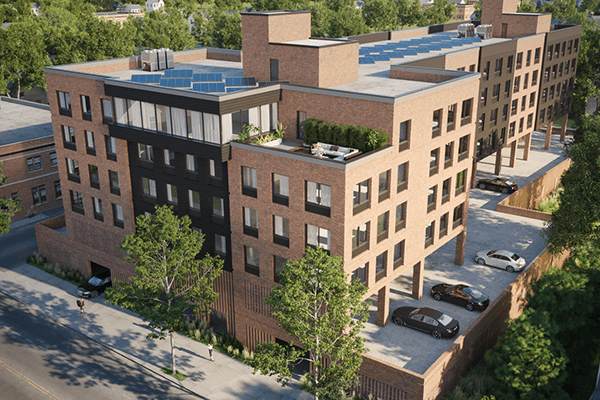|
RCBJ-Audible (Listen For Free)
|
Community Groups Continue to Show Support For More Affordable Housing; Haverstraw Collaborative Says County’s Nonprofits Cannot Hire Without More Affordable Housing Options
By Tina Traster
No other enclave of Rockland County has shown a greater commitment to developing affordable housing than the Village of Haverstraw. Over the past several years, village officials have worked with at least three developers who planned to create more than 250 affordable units, along with other investment benefits, including a village parking deck, reclamation of blighted riverfront land, and open space.
Now the fate of two of these projects remains uncertain, while a third has been scuttled.
At issue is whether Haverstraw Supervisor Howard Phillips will continue to stand in the way of two pending projects by withholding support for PILOTs (payment in lieu of taxes), which are arranged though Rockland County Industrial Development Agency (IDA), but need to be negotiated separately with each relevant town, village and school district.
In 2023, the village negotiated a public/private partnership with the Westchester-based Westhab Inc., the largest nonprofit developer of affordable housing in the Hudson Valley. The village has agreed to a 99-year ground lease for 30 West Street, a village-owned parking lot adjacent to the firehouse, without any upfront or ongoing payments. In exchange, the developer has plans to build 81 units of affordable housing for residents earning up to 60 percent of area median income (AMI). Rents will be targeted to income tiers ranging from 30 percent to 60 percent of AMI. Westhab has agreed to incorporate 82 community parking spaces into the project. Some units will be reserved for formerly homeless individuals and those with mental health disorders, addressing critical housing needs in the community.
The IDA signed off on the Westhab PILOT program last December but the developer has not secured approvals from the taxing authorities.
“We’re in the midst of negotiating for PILOT terms with the various taxing authorities,” said Andrew Germansky, senior vice president of real estate at Westhab. “We are hopeful we can come to terms on an agreement that works for Westhab and the taxing authorities to make this 100 percent affordable housing development financeable. We need a PILOT to complete this project.”
The village has been seeking developers and partners to meet the growing challenge of high housing costs in Haverstraw: 30 percent of renters in the area earn less than $30,000 annually and 60 percent of renters pay more than 35 percent of their income on rent.
Insiders say the Westhab project appears to be on track but there is ongoing concern Phillips is using whatever tactics are available to thwart a significant influx of affordable housing in the village. The Supervisor has made his position clear in both private conversations and in public spaces, saying Haverstraw has done its “fair share” of building affordable housing and that other towns in Rockland need to pick up the slack.
Phillips’ machinations come at a time when Rockland County is desperate for affordable housing. The issue was front and center at the county’s annual housing forum in the early spring. Town supervisors and mayors constantly evoke the need for more affordable housing when speaking publicly, but there’s been little to no progress across the county.
Many believe Phillips is weaponizing the use of PILOTs, which projects like Westhab and others typically rely upon to get built. To score PILOTs, developers need to secure approvals from the village, county, school board, and the town. In closed door meetings, Phillips continues to express an unwillingness to get behind PILOT programs for these projects.
In May, Phillips and his town board orchestrated a plan to get the Knights of Columbus to donate its brick building at 56 West Broad Street to the town rather than follow through with a two-year negotiation to sell the building to St. Katherine Group of Port Chester for $2.4 million. The developer had promised more than 100 affordable units, space in perpetuity for the Knights, and a parking deck for the Village. The developer was also amenable to allocating space for a senior center.
St. Katherine Group is seeking reimbursement for project costs from the Knights of Columbus and is considering suing the town for its role in orchestrating the breach.
Also at stake in the village is a proposed $330 million development to revitalize the former Chair Factory site, a long-blighted nine-acre peninsula that juts into the Hudson River.
The Huntington, Long Island-based MPact Collective has spent several million to assemble a team for its envisioned riverfront pedestrian-oriented hub that will include 450 housing units, 70 percent of which will be a combination of affordable and 40-year rent stabilized workforce housing. The original plan also included 14,000-square-feet of retail that connects with Allison Avenue, green spaces lacing the perimeter of the site to make the Hudson River accessible for kayaking and boating and built- in protection for climate change flooding. The proposed 150-room hotel is slated for the second phase.
In 2022, the village won a $10 million downtown revitalization grant (DRI) from New York State. Portions of the grant are being used for infrastructure on the site.
But MPact Collective will not purchase the property until the PILOT it is seeking, and other state and private funding, is in place. The developer plans to pay nearly $8 million for the site, as well as three to four private parcels it is in the process of acquiring.
MPact Collective has been actively working to gin up support for its project – and derivatively for affordable housing in the village. On Wednesday, the developer will address members of the Haverstraw Collaborative, a coalition of nonprofits, at the Haverstraw Center. This band of organizations is concerned about the lack of affordable housing, saying they are unable to recruit employees because there is nowhere for them to live.
Germansky is expected to attend the meeting.
To champion the Westhab project, the village in January passed the RIZ (Residential Inclusionary Zoning) overlay, which gave the developer the density it needed. The four story, 79,000 square-foot building will be a mix of studio (20), one-bedroom (20), two-bedroom (33), and three-bedroom units (7), with one parking space per unit.
The project would turn a non-revenue generating property into one that brings in annual property taxes.
According to the developer’s application, the $45 million project, which is to be designed by Suffern based Aufgang Architects, will not displace any residents. Community parking will generate revenue for the village, while eliminating the cost of village maintenance. The project will benefit from density bonuses for green building, solar, affordable housing, and public parking, and will take advantage of reduced parking requirements for affordable housing.
The development will rely on bank financing of about $7 million, state, federal grants and tax credits of about $20 million, New York State subsidies of about $12 million, and Rockland County and other funding sources of about $6.6 million, according to public documents.
The project developer is seeking a PILOT (Payment In Lieu Of Taxes) program and has been approved for one by the Rockland IDA. In Rockland County (unlike other counties in New York), the IDA can approve a PILOT, but the terms of the PILOT are the subject of negotiations with the town, village, school district and county, with each entity voting independently on participation.
Last month, Rockland County Executive Ed Day and ARPA Director Jenna Nazario approved $1.8 million in ARPA (American Rescue Plan Act) funding for the project. It also received $800,000 from the Office of Community Development.













